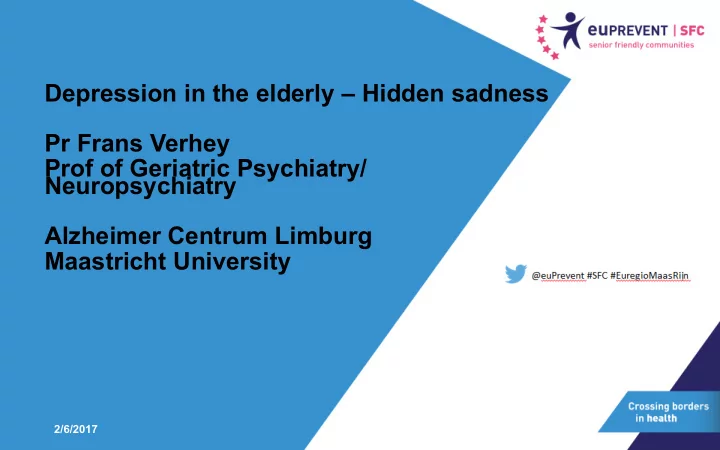

Depression in the elderly – Hidden sadness Pr Frans Verhey Prof of Geriatric Psychiatry/ Neuropsychiatry Alzheimer Centrum Limburg Maastricht University 2/6/2017
Ms Magnee ’ s chair 2/6/2017
Ms Magnee ’ s chair 2/6/2017
Content • What is depression • What is depression in the elderly • Why should municipalities bother? • What can they do? • Conclusion 2/6/2017
What is depression ? 2/6/2017
What is depression ? • Depression when lasting for at least 2 weeks, all the time • Emotional • Physical • Thinking/ Cognitive 2/6/2017
Symptoms of depression (DSM-5) Every day, most of the day, > 2 weeks • Feeling depressed during most of the day, particularly in the morning • Diminished interest in almost all activities • Feeling tired • Feeling worthless or guilty • Impaired concentration, indecisiveness • Cannot sleep • Thinking of death or suicide all the time (not just fearing death) • Feeling restlessness or being slowed down • Significant weight loss or weight gain 2/6/2017
Depression in the elderly • ‘ Full ’ depression less common • Depressive symptoms more frequent ( ‘ minor ’ ) • Higher level of somatic complaints • Less prone to ask for professional help • Other profile of risk factors • Loneliness • Losses • of autonomy, of family and friends, of social roles • Chronic diseases • Informal carers 2/6/2017
Epidemiology • 1-2% of elderly • ‘ Minor ’ depression: 10-20% • 10-15% in Primary Care • 20-30% in Nursing home • 11-45% in Inpatient setting • >25% of informal carers 2/6/2017
Hidden sadness • Elderly do not want to complain • Present as somatic disorder ( ‘ tired ’ ) • In most cases, they do have somatic conditions • Professionals do not recognize as depression • Wouldn ’ t you be depressed yourself? 2/6/2017
2/6/2017
Common precipitants • Arguments with friends/relatives • Rejection or abandonment • Death or major illness of loved one • Loss of pet • Anniversary of a (-) event • Major medical illness or age-related deterioration • Stressful event at work • Medication Noncompliance • Substance use 2/6/2017
Why should municipalities bother? 2/6/2017
Why should municipalities bother? Not only a medical problem 2/6/2017
Prevention and treatment of depression 2/6/2017
Prevention: general • General education • Awareness campaigns • Courses for elderly to be prepared to new phase 2/6/2017
Prevention: aimed at risk groups • Informal carers • Widows • Chronic diseases • Lonely elderly • Elderly who are living in institutions • Peer groups, support, respite care, meeting centres • Visiting services 2/6/2017
Prevention: Elderly who have some depressive complaints • Awareness campaign • Social activities • Courses ( ‘ In de put, uit de put ’ ) • Screening by GP or other HCP 2/6/2017
Conclusion • Depression in the elderly is important and frequent problem • Underreported, underrecognized • Prevention is important task for the communities • Senior Friendly Community will assist with their products 2/6/2017
Recommend
More recommend